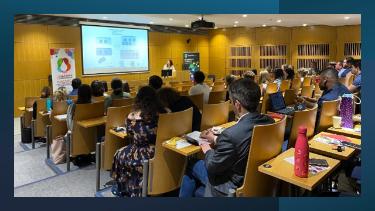Work/Life Balance at SBI: Finding a Place to Call Home

Systems Biology Ireland (SBI) at University College Dublin (UCD) has always been a very international group. Currently, the team of 72 research staff, students and operations professionals come from 25 nations and 5 continents. Every year, new team members are welcomed to SBI, many of whom are unfamiliar with Dublin or are moving to Ireland from abroad. We receive a lot of questions about housing -- where people should look, how much they should expect to pay, and what tips we can offer.
Dublin is one of Europe’s most expensive cities, and finding accommodation that is affordable, safe, and within a reasonable commuting distance to UCD can be daunting. The UCD campus is located at Belfield in the D4 postal district on the South side of Dublin, which has some of the most expensive neighbourhoods in Ireland. And while there are regular public transit options available, commuting times can be quite significant, even from within the city, and particularly during peak times.
There is an extensive amount of information available online to help anyone new to the area navigate the moving process and understand what a realistic cost of living looks like for someone starting out here. Links to several recommended sources are listed at the end of this article. But for the moment, here is a more personal representation of what "home" looks like for many currently working at SBI. These insights are taken from a recent voluntary SBI survey in which 32 staff and students participated.
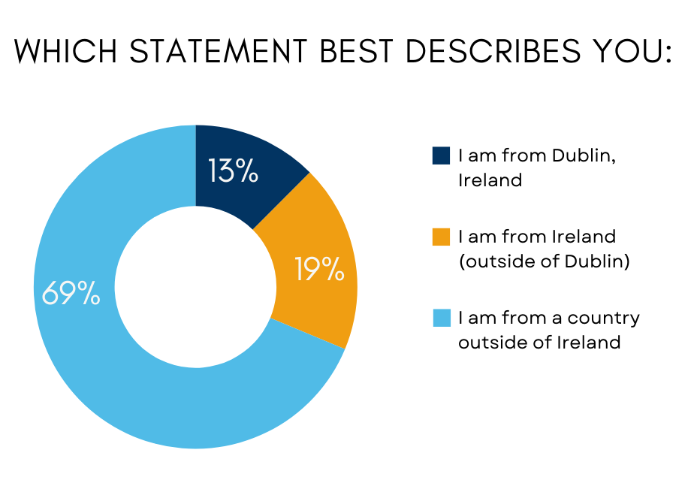
Where we live
Nearly all of our respondents live in rented accommodation, with only two answering that they own their home or live with a partner who owns their home. Nearly 60 percent of participants live in shared apartments, houses, or rooms with other tenants who are not family and the remaining 41 percent live alone or with immediate family in an apartment or house.
Our survey also showed that most participants live in Dublin City, particularly the D4, D6, D14 and D18 postal districts. In addition, two participants live in Co. Wicklow, one in Co. Kildare and one in Co. Louth.
One participant said, “Location is everything. Think about transport, grocery shopping etc especially if you don’t have a car. If the nearest supermarket is a 30-minute walk with no transport links, make sure to think about that.”
Regarding housemates and renting in general, another respondent advised, “Take time, if you can, to find the right home and housemates for you. Having a nice, inviting, comfortable, safe space that you can switch off from study/work is important.”
Someone currently living outside the county said, “Be willing to live a bit further afield - your commute may not be that much longer than living in the Dublin suburbs and your rent or mortgage payments will be noticeably lower.”
Commuting
While on the subject of commuting, we asked how long SBI team members typically spend en route to UCD from their various (mostly) Dublin locations and what modes of transport they prefer to use.
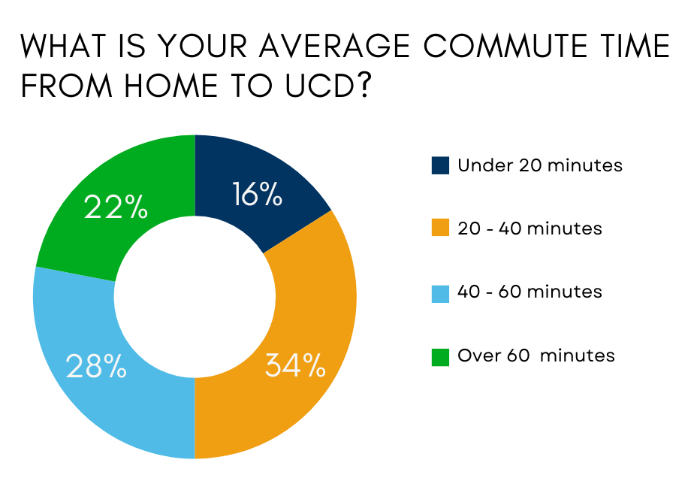
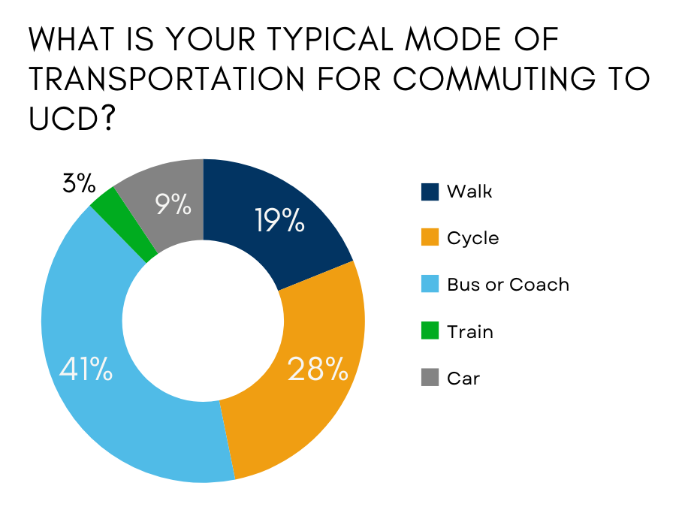
UCD Estates recently completed an extensive commuting survey taken from people all across campus. Their findings were similar to ours, though the commute times from our survey were, on average, slightly better than the overall University findings. Either way, it is important to think about what a realistic commuting time looks like for you, along with convenience of transport options and commuting costs such as petrol, tolls, or bus fares.
UCD also gives employees access to the Government Tax Saver Schemes which offer tax-free bus and rail tickets and tax-free bikes for cycling to work. UCD students can avail of a Bike Library and free shuttles to a number of central locations. For more information about commuting to UCD, check out Commuting to Campus 2023 (PDF).
It is also worth mentioning that UCD is still operating a “test period” for hybrid/remote working, and SBI follows the UCD protocols. If your supervisor offers some flexibility around remote working, you may be more comfortable living further away from campus. Please be aware that any hybrid working must first be approved by your individual line manager.
How much we pay
It may seem rude to talk money, but, for many, finding the right housing option is primarily influenced by cost. Here’s what our survey participants said:
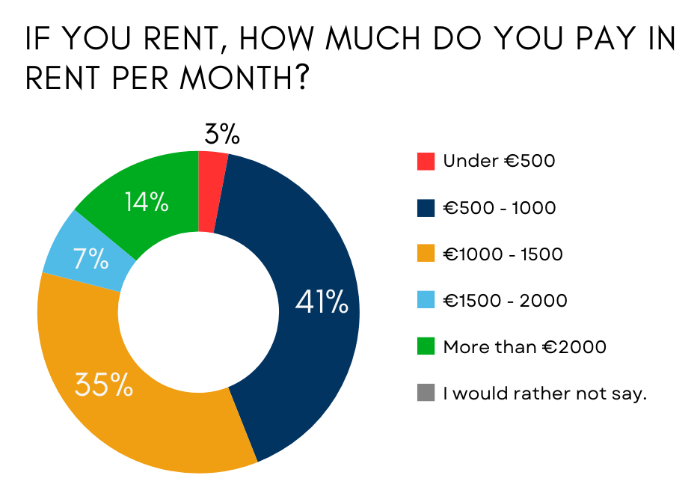
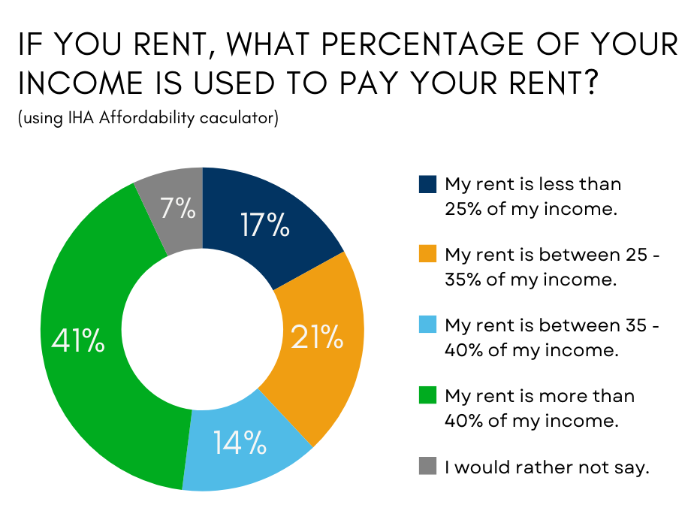
While the SBI numbers may seem high to someone just moving to the area, in general they are not too bad when you compare prices around the city. Some landlords will not be as likely to raise rents if they are happy with long term, reliable tenants, which may account for some of the lower numbers. Also, some of our team indicated they were living with family for reduced rates.
According to Daft.ie’s annual rental report (PDF), rents are still increasing, but at a slightly slower rate than they were a year or two previously. The national average, as of May 2024, is €1,836 per month (presumably for a 1 bedroom apartment, though the methodology was not clear to this author). Unfortunately, the most recent Residential Tenancies Board rental tendencies index revealed that rents for new tenancies are substantially higher - nearly 18 percent higher - than for existing tenancies.
As mentioned previously, 59 percent of our survey respondents indicated that they live in shared housing with tenants whom they do not classify as family. This is undoubtedly the more affordable option for most people, including many early career researchers. It is more unusual for an individual to live alone, perhaps in a studio or 1 bed apartment, but it can be done in some circumstances.
We also asked our survey takers who are currently renting how they felt about value for money in their living situations. Respondents rated their rental situations on a scale of 1 – 5, with 1 being Very Poor Value for Money and 5 being Excellent Value for Money. Fifteen individuals, or 57 percent of the 23 who responded, scored Value for Money right in the middle at 3. Only one person indicated their rental accommodation was Excellent Value for Money.
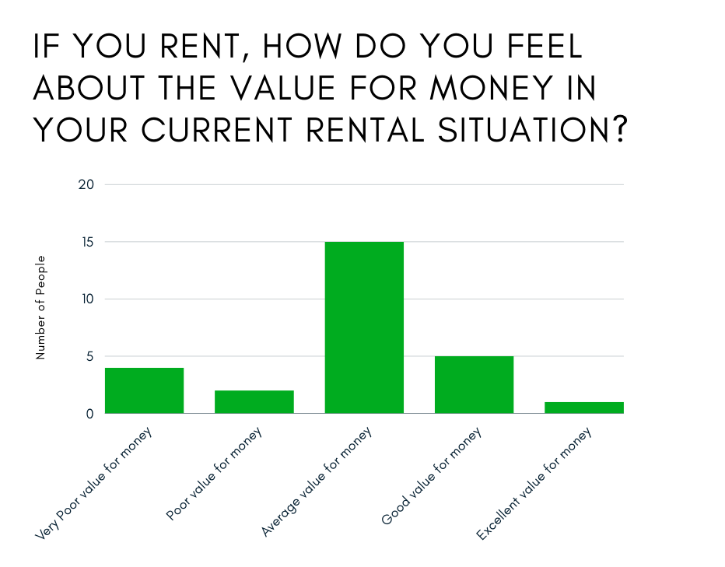
How we found places to rent
On the surface, it looks like Dublin is full of available housing. Most people start by checking out Daft.ie, and there are no shortage of options listed there. However, getting an apartment or house from sources such as this is not always simple – often you will be expressing your interest for a place along with dozens of other worthy home hunters. You may not hear back from the person listing the flat if they are inundated or have already picked tenants. There is no way of knowing where you fall in this frustrating pecking order. The best course of action is to keep looking until you have a signed lease in your hand. You may need to put out more inquiries than you’d like – one of our survey participants says, “Never give up! It is normal to get only one or two replies on Daft.ie, even if you send more than 100 emails.”
Although 57 percent of our survey participants said they found their rental accommodation via Daft, there were still 28 percent who said they successfully found a place through a personal referral from a colleague, friend or family member. This often being the case, incoming staff or students are always welcome to ask for referrals and the admin team will send out an email notice amongst colleagues inquiring for potential housing leads.
Here's some more advice from our team members:
“Try to use whatever networks you have to find a place, e.g. word of mouth, friends of friends or [Facebook] pages. It's very hard to get a sense of who you are moving in with until you do, and some personal connection or link helps.”
“Talk to people, ask if people know of any upcoming rental availability. A lot of accommodation gets passed on by word of mouth. These can also sometimes be slightly cheaper than what is available online.”
“Activate notifications on daft.ie matching your preferences. Send an email as soon as you see new ads being posted.”
“Finding a good housing is difficult and expensive! It's cheaper to rent an apartment with friends/colleagues/etc. Be ready for the cultural diversity.”
“Be patient. Housing in Dublin is very fast living and spontaneous - so keep your eyes and ears open and look every day if there is something new.”
And finally…
- Start looking before you move and outside of peak times (e.g. start of term) if at all possible.
- Never pay any deposits or fees in advance before viewing and/or checking out your vendor. Beware of scams!
- Be aware of certain biases landlords may have towards couples vs. groups of friends and/or students and reliable, larger incomes vs. short term contracts or stipends.
- Be open to temporary options like short-term rentals while you find your feet.
- Temporary “host family” situations can be an option but try to get as much information about the family and your living space in advance (e.g. are there house rules).
- Check out the An Garda Síochana or the Central Statistics Office websites as primary sources of information if you are concerned about crime rates.
- Check out UCD Resources below such as the Financial Planning and Financial Well Being websites for staff and students and take their advice to heart – many of our survey participants indicated that the cost of rent directly impacted other key expenses such as utility bills, food, and socialising/entertainment.
Helpful Links:
UCD Global - Ireland and Dublin Cost of Living
UCD Off-Campus Accommodation (Accommodation Pad)
Financial Wellbeing (UCD Staff)
Employee Assistance Services (UCD Staff)
Bank of Ireland 50/30/20 Budgeting
About the author
Maryann Kelly looks after all the communications initiatives in SBI in addition to managing a variety of administrative and operational tasks in the centre. As an American ex-pat, she and her family are no strangers to the Irish rental market, having moved house four times in six years.

